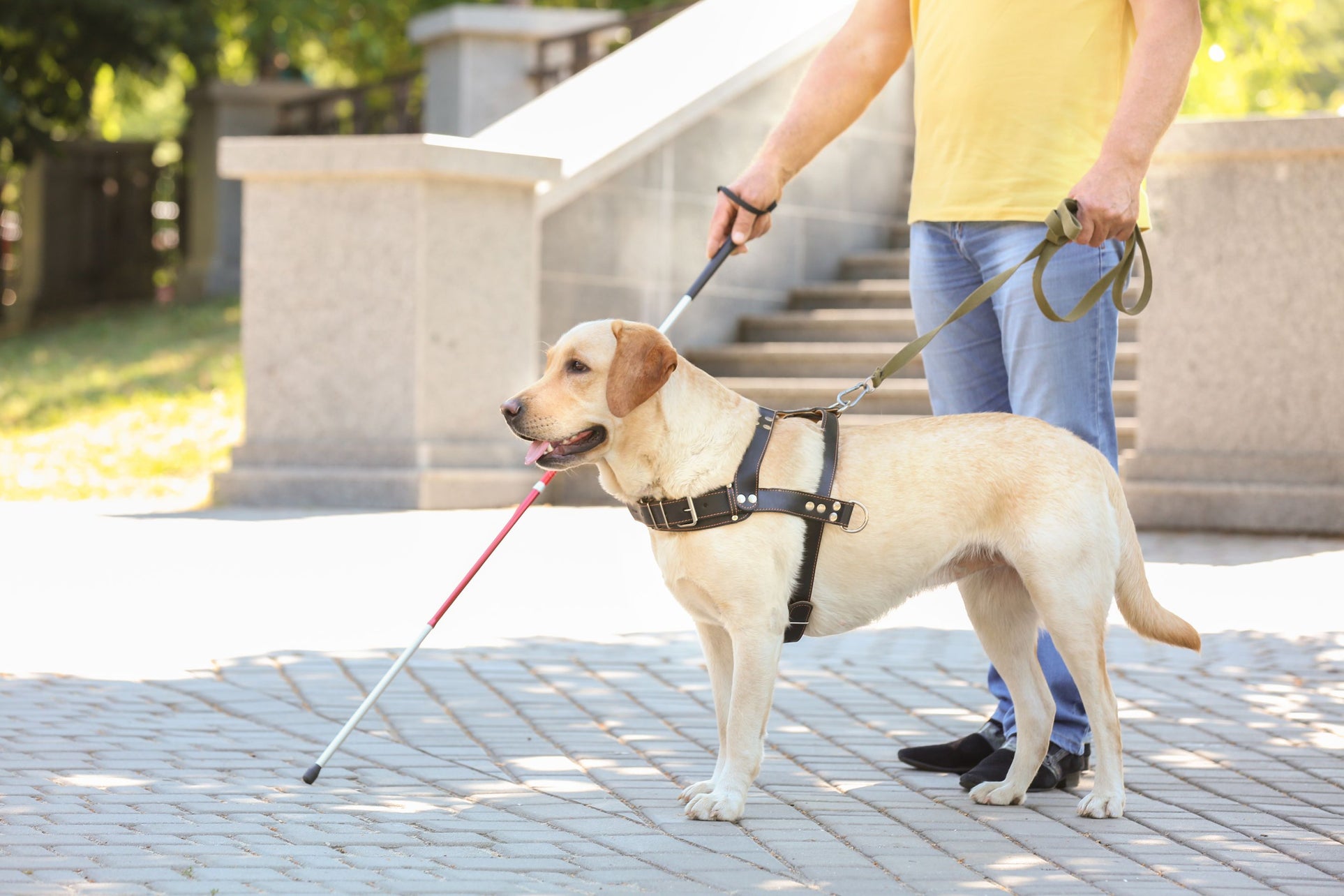
Guide Dogs: Guides for People with Vision Loss
April 28, 2021We all know how our beloved K9s always have a knack for lifting our moods, lowering our stress levels, and even giving our lives an extra meaning! But to a person that has been challenged with the loss of sight, a guide dog means even more to them!
What Are Guide Dogs?
Guide dogs are specially trained and certified to help their person around obstacles, access public transportation, and even cross roads safely. They also help with many other daily tasks around the house to help their visually impaired loved ones. Not only do they guide their human, but they also offer them the ability to be socially interactive and always show them love and comfort.
What Makes Labradors the Best Guide Dogs?

The Labrador's suitability as a guide dog is due to its temperament along with intelligence and talent. The Labrador Retriever is a loving and loyal companion and a rapid learner, and a proactive thinker. These qualities, combined with the dog's strong and ready physicality, predispose the breed to success as a guide animal.
Labs are known for accomplishing almost anything that a trainer or owner asks when given enough time and guidance. The Labrador Retriever possesses a strong work ethic and an extremely high level of intelligence and will do almost anything to please or help their human.
Why are Guide Dogs Essential?
Soldiers returning home from the war had become blind from poisonous gases after WWI. Realizing that these soldiers needed some help to navigate their “new world,” Dr. Gerhard Stalling from Germany came up with the idea of training mass numbers of dogs to help these men. In 1916, Stalling opened the world’s first guide dog school. Eventually, more guide dog schools sprang up throughout Germany.

The schools trained a total of 600 dogs a year. Along with ex-soldiers, the schools provided guide dogs to blind people throughout the world. Due to a reduction in dog quality, the schools were eventually forced to close.
In the 1920s, an American dog trainer named Dorothy Harrison Eustis helped relaunch the guide dog movement. Eustis helped train America’s first guide dog, Buddy. In 1929, she founded the Seeing Eye School in New Jersey. Now, there are guide dog schools in Europe, Japan, Australia, and North America. Thanks to these schools, guide dogs have helped transform thousands of lives.
Guide Dog Training

All guide dogs go through vigorous training to learn and perfect the skills needed to aid their human. There are two stages of training that the dogs must pass. Preparation starts as soon as they can eat on their own and go potty in a designated area.
Like most dogs, they start small - sit, stay, down, and heel. Once the dog has mastered these, they earn the “jacket privileges.” Jacket privileges include going to classes, retail stores, and then, once they have learned those, they get to go to a restaurant.
During stage two of the training, which wouldn’t be until they are a year-and-a-half old, they start the formal training, which can take 3-6 months. They will be matched with the “perfect fit” human according to the dog’s ability and personality. They will need continual training and skill reminders for the remainder of their lives to ensure that they are continuing to serve their human in the best way possible.
Salmon Oil Supplement for Guide Dogs
Salmon oil can be beneficial for guide dogs, just like any other dog. Guide dogs, which are highly trained to assist individuals with visual impairments, have specific dietary and health needs to maintain their well-being and optimal performance. Here's how salmon oil for dogs can be advantageous for them:
-
Omega-3 fatty acids: Salmon oil is rich in omega-3 fatty acids, particularly EPA (eicosapentaenoic acid) and DHA (docosahexaenoic acid). These essential fatty acids provide numerous health benefits, including supporting heart health, promoting a shiny coat, and improving cognitive function.
-
Joint health: Guide dogs often lead active lives and may benefit from the anti-inflammatory properties of omega-3 fatty acids found in salmon oil. These fatty acids can help reduce inflammation in joints, potentially supporting joint health and mobility, which is crucial for guide dogs.
-
Skin and coat health: The omega-3 fatty acids in salmon oil help nourish the skin and promote a healthy coat. This can be particularly important for guide dogs, as their appearance and grooming reflect their professional role and enhance their connection with their handlers.
-
Cognitive function: Omega-3 fatty acids have been linked to improved brain health and cognitive function. This can be beneficial for guide dogs, as they need to stay alert, focused, and responsive to their handlers' commands.
When considering adding salmon oil to a guide dog's diet, it's important to consult with a veterinarian. They can provide guidance on the appropriate dosage based on the specific needs and health condition of the individual guide dog. Additionally, they can help ensure that the addition of salmon oil fits within the dog's overall nutrition plan.
How Can You Help?
Research shows that guide dogs offer increased mobility, boost a person’s confidence, provide companionship, and even lead to increased social interaction. You can help change lives too!
It can take up to two years and $25,000 to fully train a single service dog. We encourage you to go to GuideDog.org and do what you can to help. There are many ways you can help. Donate money, volunteer your time, run some community fundraisers and so many others!
